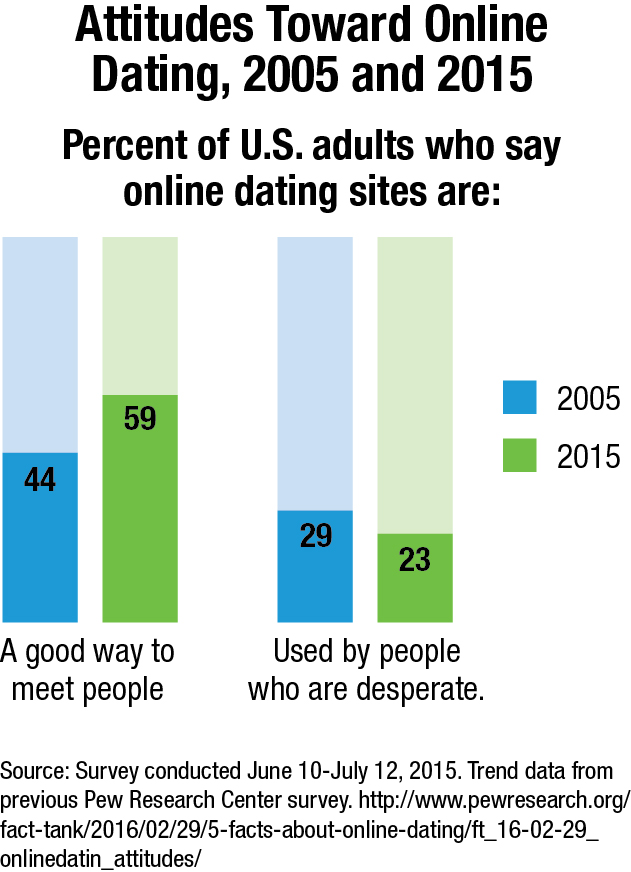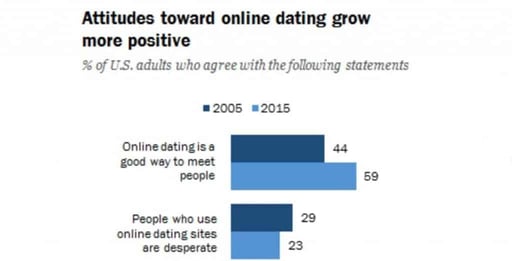
· One in ten Americans have used an online dating site or mobile dating app; 66% of these online daters have gone on a date with someone they met through a dating site or app, and 23% have met a spouse or long term partner through these sites. Public attitudes toward online dating have become more positive in recent years, but many users also report negative experiences · A new Pew Research Center study explores how dating sites and apps have transformed the way Americans meet and develop relationships, and how the users of these services feel about online dating. Here are 10 facts from the study, which is based on a survey conducted among 4, U.S. adults in October · 42% of all Americans know an online dater, and 29% know someone who has used online dating to find a spouse or other long-term relationship. Familiarity with online dating through usage by friends or family members has increased dramatically since our last survey of online dating in Some 42% of Americans know someone who has used online dating, up from 31% in And 29% of Americans now know someone who met a spouse or other long-term partner through online dating,
Americans’ opinions about online dating | Pew Research Center
One in ten Americans have used an online dating site or mobile dating app themselves, and many people now know someone else who uses online dating or who has found a spouse or long-term partner via online dating. General public attitudes towards online dating have become much more positive in recent years, and social networking sites are now playing a prominent role when it comes to navigating and documenting romantic relationships.
One in every ten American adults has used an online dating site or a mobile dating app. Online dating is also relatively popular among the college-educated, as well as among urban pew research online dating suburban residents. Compared with eight years ago, online daters in are more likely to actually go out on dates with the people they meet on these sites. Even today, online dating is not universally seen as a positive activity—a significant minority of the public views online dating skeptically.
At the same time, public attitudes towards online dating have grown more positive in the last eight years:, pew research online dating. In general, online daters pew research online dating give the experience pew research online dating marks. Yet even some online daters view the process itself and the individuals they encounter on these sites somewhat negatively.
Familiarity with online dating through usage by friends or family members has increased dramatically since our last survey of online dating in People in nearly every major demographic group—old and young, men and women, pew research online dating, urbanites and rural dwellers—are more likely to know someone who uses online dating or met a long term partner through online dating than was the case eight years ago.
And this is especially true for those at the upper end of the socio-economic spectrum:. Even as online daters have largely positive opinions of the process, many have had negative experiences using online dating. Paid dating sites, and sites for people who are seeking partners with specific characteristics are popular with relatively large numbers of online daters:.
Even today, the vast majority of Americans who are in a marriage, partnership, or other serious relationship say that they met their partner through offline—rather than online—means.
At the same time, the proportion of Americans who say that they met their current partner online has doubled in the last eight years. This question was asked of everyone in a marriage or other long-term partnership, including many whose relationships were initiated well before meeting online was an option. Younger adults are also more likely than older ones to say that their relationship began online. In addition, pew research online dating, people who have used online dating are significantly more likely to say that their relationship began online than are those who have never used online dating.
Compared with when we conducted our first study of dating and relationships in pew research online dating, many more Americans are using online tools to check up on people they used to date, and to flirt with potential or current love interests:. And while younger adults are also more likely than their elders to look up past flames online, this behavior is still relatively common among older cohorts.
Today six out of every ten Americans use social networking sites SNS such as Facebook or Twitter, pew research online dating these sites are often intertwined with the way they experience their past and present romantic relationships:. Younger adults are especially likely to live out their relationships through social networking sites. These sites are also being used as a source of background research on potential romantic partners.
As more and more Americans use social networking sites, these spaces can become the site of potential tension or awkwardness around relationships and dating. Not surprisingly, young adults—who have near-universal rates of social networking site use and have spent the bulk of their dating lives in the social media era—are significantly more likely than older social media users to have experienced all three of these situations in the past.
And women are more likely than men to have blocked or unfriended someone who was flirting in a way that made them uncomfortable. The results in this report are based on data from telephone interviews pew research online dating by Princeton Survey Research Associates International from April 17 to May 19,among a sample of 2, adults, age 18 and older.
Telephone interviews were conducted in English and Spanish by landline 1, and cell phone 1, including without a landline phone, pew research online dating. About Pew Research Center Pew Research Center is a nonpartisan fact tank that informs the public about the issues, attitudes and trends shaping the world.
It conducts public opinion polling, demographic research, media content analysis and other empirical social science research. Pew Research Center does not take policy positions.
It is a subsidiary of The Pew Charitable Trusts. Home U. Numbers, Facts and Trends Shaping Your World. Publications Topics Presentations Datasets Interactives Fact Sheets Our Experts. Main More. com, eHarmony, or OK Cupid, pew research online dating.
Attitudes towards online dating are becoming more positive over time Even today, online dating is not universally seen as a positive activity—a significant minority of the public views online dating skeptically.
Negative experiences on online dating sites are relatively common Even as online daters have largely positive opinions of the process, many have had negative experiences using online dating.
One in five online daters have asked someone to help them review their profile. ADD TO ALEXA. Popular on pew research. Defining generations: Where Millennials end and Generation Z begins. before the pandemic. Broad agreement in U. Quiz: Are you a Core Conservative? A Solid Liberal? Or somewhere in between?
Research Areas. Follow Us. We need to confirm your email address. To complete the subscription process, please click the link in the email we just sent you.
Online Dating | Pew Research Center

Online Dating & Relationships | Pew Research Center's Internet & American Life Project blogger.com[3/5/ AM] “online daters.” In terms of demographics, online dating is most common among Americans in their mid’s through mid’s. Some 22% of year olds and 17% of year olds are online daters. Online · Pew Research Center has long studied the changing nature of romantic relationships and the role of digital technology in how people meet potential partners and navigate web-based dating platforms. This post focuses on the patterns, experiences and attitudes related to online dating in America. These findings are based on a survey conducted Oct. 16 to 28, , among 4, U.S. adults. This includes those who took part as members of Pew Research · A new Pew Research Center study explores how dating sites and apps have transformed the way Americans meet and develop relationships, and how the users of these services feel about online dating. Here are 10 facts from the study, which is based on a survey conducted among 4, U.S. adults in October
Keine Kommentare:
Kommentar veröffentlichen